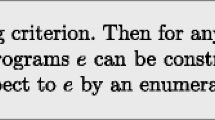Summary
The author's inquiry [1] on learning systems is generalized in the following respects: The process of learning, instead of coming to an end when the learning goal has been reached, is supposed to last for ever, so that the above “definitive” learning as well as phenomena such as forgetting, re-learning, changing the goal etc. become describable.
We take over the notion of semi-uniform solvability of a set Γ of learning problems (2.2), but now (trivial cases excluded) the whole capacity of a learning system is never s. u. solvable. Finite such sets Γ are. The notion of a solving-basis of some Γ is introduced and we can state necessary conditions that Γ possess such a basis (2.14), so that examples of sets Γ without a basis can be provided. On the other hand, any s. u. solvable Γ has as basis. The notion of uniform solvability (3.1) reinforces that of s. u. solvability, and there are given sufficient conditions for Γ to be uniformly solvable (3.6). In some “finite cases”, s. u. solvability, existence of a basis and uniform solvability coincide (3.7–3.9). At last we give the construction for the weakest learning system solving a uniformly solvable problem set (3.12–3.19).
Similar content being viewed by others
References
Menzel, W.: Theorie der Lernsysteme. Berlin-Heidelberg-New York: Springer-Verlag 1970
Author information
Authors and Affiliations
Additional information
Eine deutsche Fassung wurde am 30. Mai 1972 eingereicht.
Rights and permissions
About this article
Cite this article
Menzel, W. An extension of the theory of learning systems. Acta Informatica 2, 357–381 (1973). https://doi.org/10.1007/BF00289505
Received:
Issue Date:
DOI: https://doi.org/10.1007/BF00289505




